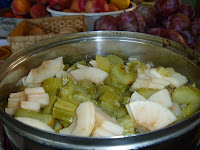A few weeks ago I read a snippet somewhere that vinegar can be used as a weed spray outdoors. Having found uses for vinegar indoors I could not wait to trial vinegar in the outdoors. Further research on the Internet brought up numerous articles on vinegar (or acetic acid) as a herbicide - read some here and here and here.
So here is our home trial of vinegar as a herbicide and the results we have observed so far.
I filled a pressure spray pack with 2 litres of vinegar (just the cheap white vinegar) and added a small squirt of dishwashing liquid (to help get better leaf coverage) and went out to the front yard to trial my new herbicide on cat's ear, paspalum, couch and dandelions (photos in this order).
The photos on the left show photos of the weeds at the time of spraying and the photos on the right are the same plants just 2 days after.
The results look promising.
Vinegar (or acetic acid the main chemical in vinegar) acts as a drying agent on the leaves of the plants. You need to apply the vinegar on a warm sunny day to get the best effect (or the best drying out) - and the leafy plants like the dandelions showed signs of drying out almost immediately. Even the grasses (paspalum and couch) are showing signs of being weakened. Vinegar is a broad spectrum herbicide so you need to be careful with your spraying - spray only the plants you want to kill and do not spray on a windy day. Vinegar is not as powerful as commercial broad spectrum herbicides- and you should expect to have to reapply your treatment several times.
I am inspired by my initial results and will keep repeating the vinegar applications on our next sunny day to keep weakening the weeds and hopefully eventually eliminate them from this section of our garden.






















